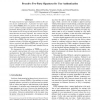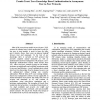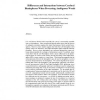2399 search results - page 48 / 480 » On Authentication between Human and Computer |
CHI
2008
ACM
16 years 2 months ago
2008
ACM
Controlling the privacy of online content is difficult and often confusing. We present a social access control where users devise simple questions of shared knowledge instead of c...
131
click to vote
NDSS
2003
IEEE
15 years 7 months ago
2003
IEEE
We study proactive two-party signature schemes in the context of user authentication. A proactive two-party signature scheme (P2SS) allows two parties—the client and the serverâ...
131
Voted
IPPS
2007
IEEE
15 years 8 months ago
2007
IEEE
Most of the current trust models in peer-to-peer (P2P) systems are identity based, which means that in order for one peer to trust another, it needs to know the other peer’s ide...
147
click to vote
DCOSS
2008
Springer
15 years 3 months ago
2008
Springer
Abstract. This paper presents a protocol called SAKE (Software Attestation for Key Establishment), for establishing a shared key between any two neighboring nodes of a sensor netwo...
115
click to vote
WAPCV
2007
Springer
15 years 8 months ago
2007
Springer
It is well known that the brain (especially the cortex) is structurally separable into two hemispheres. Many neuropsychological studies show that the process of ambiguity resoluti...



